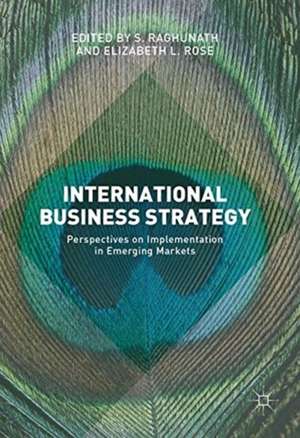International Business Strategy: Perspectives on Implementation in Emerging Markets
Editat de S. Raghunath, Elizabeth L. Roseen Limba Engleză Paperback – 13 noi 2020
| Toate formatele și edițiile | Preț | Express |
|---|---|---|
| Paperback (1) | 661.24 lei 6-8 săpt. | |
| Palgrave Macmillan UK – 13 noi 2020 | 661.24 lei 6-8 săpt. | |
| Hardback (1) | 882.55 lei 6-8 săpt. | |
| Palgrave Macmillan UK – 23 dec 2016 | 882.55 lei 6-8 săpt. |
Preț: 661.24 lei
Preț vechi: 777.92 lei
-15% Nou
Puncte Express: 992
Preț estimativ în valută:
126.59€ • 131.58$ • 104.96£
126.59€ • 131.58$ • 104.96£
Carte tipărită la comandă
Livrare economică 06-20 februarie 25
Preluare comenzi: 021 569.72.76
Specificații
ISBN-13: 9781349713554
ISBN-10: 1349713554
Pagini: 476
Ilustrații: XXI, 476 p. 28 illus., 3 illus. in color.
Dimensiuni: 148 x 210 mm
Greutate: 0.59 kg
Ediția:1st ed. 2017
Editura: Palgrave Macmillan UK
Colecția Palgrave Macmillan
Locul publicării:London, United Kingdom
ISBN-10: 1349713554
Pagini: 476
Ilustrații: XXI, 476 p. 28 illus., 3 illus. in color.
Dimensiuni: 148 x 210 mm
Greutate: 0.59 kg
Ediția:1st ed. 2017
Editura: Palgrave Macmillan UK
Colecția Palgrave Macmillan
Locul publicării:London, United Kingdom
Cuprins
Introduction.- Chapter 1: International Business in the Context of Emerging Economies (S. Raghunath and Elizabeth L. Rose).- International Strategy in the Emerging-market Context: The Big Picture.- Chapter 2: Corporate Governance in Emerging Economies: A Review of Developments in the Principal-principal Agency Perspective (Kshitij Awasthi).- Chapter 3: Internationalization of Emerging-market Firms: The Contingent Role of Board Capability (Sandeep Sivakumar, Sreevas Sahasranamam and Elizabeth L. Rose).- Chapter 4: Research in Multipoint Competition: What Do We Know and Where Are We Headed? (Rupanwita Dash).- Strategic Changes in Organizational Forms.- Chapter 5: Internalization of IJVs and Institutions (Shailen Kumar Dalbehera, S. Raghunath, R. Srinivasan, Murali Patibandla, and V. Nagadevara).- Chapter 6: Do Spin-offs Really Create Value? Evidence from India (Kambla Venkatesh).- Chapter 7: The Influence of Liabilities of Origin on EMNE Cross-border Acquisition Completion (Shobhana Madhavan and Deepak Gupta).- Chapter 8: Business Model Innovation and its Sustainability in International Strategic Alliances (Thomas Joseph and S. Raghunath).- Entrepreneurship and Exporting.- Chapter 9: Emerging-market Born Globals: The Influence of Product-related Factors on Internationalization Mode in the Indian Apparel Industry (S. Raghunath and Krishna Kumar Balaraman).- Chapter 10: Innovation and Entrepreneurship in the Informal Economy: Insights from the Ground Zero (Pavan Soni).- Chapter 11: Determinants of Export Performance: An Empirical Analysis of the Indian Pharmaceutical and Automobile Industries (Satyanarayana Rentala, Byram Anand, and Majid Shaban).- Finance and Technology.- Chapter 12: FDI and Economic Growth Nexus for the Largest FDI Recipients in Asian Emerging Economies: A Panel Co-integration Analysis (Preeti Flora and Gaurav Agrawal).- Chapter 13: Global Financial Markets Integration: A Comparative Study between Developed and Emerging Economies (Gaurav Agrawal).- Chapter 14: Vicious Cross Licensing Strategy for Technology Spread – Case Study of Samsung Electronics (P. Baba Gnanakumar).- Managing People in Emerging-market Firms.- Chapter 15: Repatriates’ Organizational Commitment in the Indian Information Technology (IT) Environment (Krishnaveni Muthiah and B.R. Santosh).- Chapter 16: Challenges in Employee Engagement in Emerging Economies (Arun Sacher).- Chapter 17: The Combined Use of Formal and Informal Ethics Training in the Indian IT Companies (Pratima Verma and Siddharth Mohapatra).- Chapter 18: Leadership Excellence in Organizations in the Mekong Region: A Comparative Study of Thailand, Cambodia, Laos, and Vietnam (Christopher Selvarajah and Denny Meyer).- Doing Well or Doing Good? Two views of CSR in India.- Chapter 19: Mandated Corporate Social Responsibility (Mcsr): Implications in Context of Legislation (Kajari Mukherjee).- Chapter 20: Connecting the Base of the Pyramid to Global Markets through E-Commerce: A Case Study of BAIF (India) (Raji Ajwani-Ramchandani).
Notă biografică
S. Raghunath is Professor of Corporate Strategy and Policy at Indian Institute of Management Bangalore, India, and Chair of the AIB-India Chapter. A specialist in international strategy, his visiting appointments have included Stanford University, INSEAD, and HEC Paris, and he has consulted with major Indian companies and multinational corporations.
Elizabeth L. Rose is Professor of International Business at the University of Otago, New Zealand, Visiting Professor at Aalto University, Finland, and Adjunct Professor at Indian Institute of Management Udaipur, India. She is a Fellow, and former Vice President, of the AIB, and has held elected positions in the Academy of Management and the Strategic Management Society.
Elizabeth L. Rose is Professor of International Business at the University of Otago, New Zealand, Visiting Professor at Aalto University, Finland, and Adjunct Professor at Indian Institute of Management Udaipur, India. She is a Fellow, and former Vice President, of the AIB, and has held elected positions in the Academy of Management and the Strategic Management Society.
Textul de pe ultima copertă
This volume fills a gap in the international business literature, offering the perspectives of researchers who are deeply embedded in one key emerging market, India. With the global economy changing dramatically, firms from emerging markets are playing increasingly important roles in both outward and inward internationalisation. International Business Strategy offers profound insights into international business activities in this rapidly-evolving environment, in which multinational corporations from emerging markets are now influential players. Reflecting the complex nature of India itself, the chapters employ a variety of theoretical lenses to shed light on a wide range of issues encountered by Indian businesses, from some of the world’s largest corporations to small, entrepreneurial firms.
Caracteristici
Brings together informed discussions on phenomena central to inward and outward internationalization in a key emerging market: India Considers a variety of perspectives on the complex issue of emerging-market internationalization: macro, meso, and micro Offers deep insights, from authors fully embedded in the modern Indian business context














